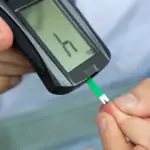
Complications
Diabetic Hypoglycemia: How To Beat That Low!
Mar 25, 2017Hypoglycemia Definition: When Blood Sugar Drops Below 4mmol/L
When blood sugar levels drop below 4mmol/L or 70mg/dL in a diabetic, the condition is called diabetic hypoglycemia. Diabetes medications (including insulin) interfere with the body’s natural blood sugar control mechanism to bring down high blood sugar. However, if you skip a meal or exercise too much, or if your medication is too high, you could end up with low blood sugar instead. Sadly, this is surprisingly common in diabetics, especially those on insulin. It can lead to seizures and loss of consciousness, and can even be deadly, if untreated.
Hypoglycemia Symptoms: Effects of Low Blood Sugar
Other Symptoms of Hypoglycemia Symptoms (Low Blood Sugar)
- General malaise
- Staring blankly, with pupils dilated
- Feeling unsteady
- Pins and needles in the hands and feet
- Feeling tremors or shakiness
- Slurred speech
- Convulsions or fits
- Loss of consiciousness / coma
Diabetic Hypoglycemia Causes
The most common cause of hypoglycemia in diabetics is their diabetes medication. To doctors, this is a known fact. Hence, they always advise you to take the medication as it is prescribed, that is, at regular intervals, before/after food, etc. The common groups of diabetic drugs that could cause diabetic hypoglycemia include –
- Biguanides(Metformin)
- Sulfonylureas (Glibenclamide)
- Postprandial blood glucose regulators (Repaglinide)
- Sitagliptin (and other gliptins)
- SGLT 2 Inhibitors
- Pramlintide Acetate (Symlin)
- Insulin shots
Other contributors to low blood sugar symptoms in a diabetic include –
- Too much exercise
- Skipping meals while on medication
- Consuming alcohol on an empty stomach
Hypoglyceimia: How To Control It
- All diabetics should carry candy with them. Pop some immediately when you feel the low-sugar symptoms, and then see your doctor. Glucose tablets can also do the trick.
- Other things that may work are regular soft drinks (non-diet) and fruit juice.
- If blood sugar levels don’t rise above 4mmol/L within 10-15 minutes, you may need to consume a fast-acting carbohydrate. Have a baked potato or a slice of white bread to bring your blood sugar levels up.
But, this information is handy only for managing an acute attack. Preventing future attacks is the best policy, since untreated diabetic hypoglycemia can be deadly.
Hypoglycemia: Actionable Prevention For Diabetics
- Consult your doctor to check if your medication dosage needs to be adjusted.
- Ensure that your diet is one that gives your body a steady source of fuel. Diabetes is a dietary disorder and the right food is, literally, your medicine.
- Don’t exceed your limits on exercise. Always increase exertion gradually.
- Be aware: Don’t ignore unexplained fatigue or lightheadedness.
- Test regularly: Know how your medication is working for you.
Diabetic Hypoglycemia: The Powerful Lifestyle Solution
Hypoglycemia is one of the deadliest side effects of diabetes, and often, of diabetic medication as well. What if diabetes could be reversed? Leading M.Ds are now working with scores of patients to reverse their diabetes.
- The starting point is always eating right. A low carbohydrate and high fat diet (LCHF diet) is a method that is gaining a lot of interest among doctors.
- Many of the same doctors are, also, rejecting the old method of eating 5-6 meals a day to avoid low blood sugar. Instead, they recommend eating only 3 times a day to help the body become sensitive to insulin again.
- These meals must include healthy fats that give the body a steady source of fuel. They will help you avoid the yo-yo-like symptoms of high and low sugars.
- Simple exercise, or even a walk, can make a huge difference.
- Stress management and sleeping well can also help you fight diabetes the right way.
- Finally, work with your medical practitioner to identify dietary supplements that can help you reduce your medicine load. A better idea is to wean off the medication slowly, rather than increasing your prescription drugs year after year.






